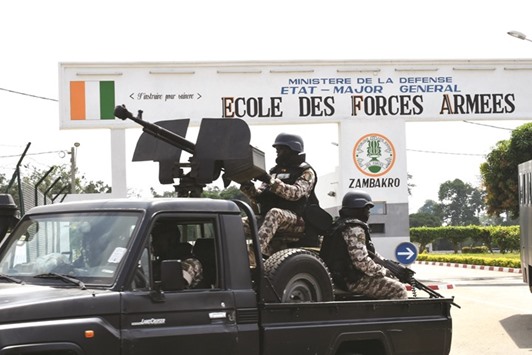Paramilitary gendarmes firing in the air yesterday sealed off access to Ivory Coast’s main port, forcing companies including cocoa exporters to close down, as weeks of unrest in the security forces showed no signs of easing.
President Alassane Ouattara, who is also facing a wave of public sector strikes, ordered his defence minister and military chiefs to hold urgent talks with members of the security forces about their grievances in a bid to quell the instability.
Ivory Coast has emerged from a 2002-2011 political crisis and civil war as one of the world’s fastest-growing economies but the violence, which began with an army mutiny nearly two weeks ago, has hit its image as a post-conflict success story.
The gendarmes — a police force under the authority of the defence ministry — poured out of their base at the port in the commercial capital Abidjan yesterday morning.
A customs official said they took up positions at entrances to the port — one of the two main export points for cocoa shipped from the world’s leading producer — bringing activity to a standstill.
“We’ve closed the factory and the warehouses to secure the cocoa,” an employee at a cocoa export firm said.
He asked not to be named as he was not authorised to speak to the media. “We asked our personnel to go home.”
Separately, guards in Bouake, the West African nation’s second largest city, also fired their weapons in front of the main prison to try to pressure the government into paying them more money, a local member of parliament said.
After a cabinet meeting yesterday, government spokesman Bruno Kone said: “The President of the Republic...asks all soldiers, gendarmes, police, customs officers, forestry service agents and prison guards to facilitate the return of calm.”
Defence Minister Alain-Richard Donwahi said the government was already in contact with those involved.
“We are going to regain control of this army so it will truly be at the service of the nation,” he told reporters.
Ivory Coast’s army was cobbled together in the wake of a 2011 civil war from rebel and loyalist factions.
It remains riven with divisions and parallel chains of command.
Soldiers — mainly ex-rebels — stormed out of their barracks and seized Bouake on January 6, and the mutiny quickly spread, forcing the government to capitulate to the mutineers’ demands.
The government started making promised bonus payments to disgruntled soldiers this week in line with an agreement to end the mutiny that began earlier this month, although the payments have angered rival factions and triggered copycat demands.
Soldiers in other segments of the military revolted in the capital, Yamoussoukro, on Tuesday, leading to clashes in which at least two soldiers were killed.

Republican guards deploy outside the military school of Zambakro, near Yamoussoukro.
